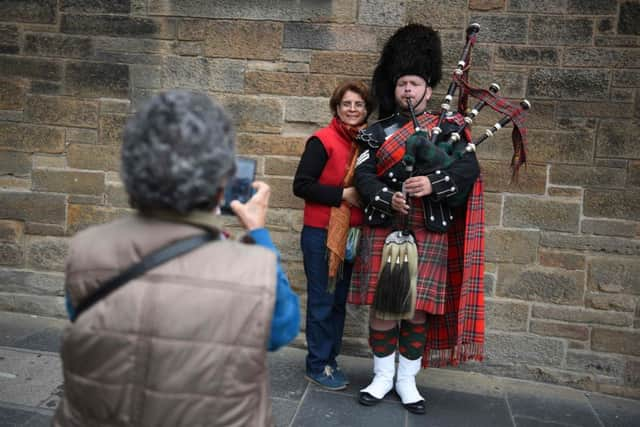Will Brexit mean boom then bust for Edinburgh tourism?


The fall in the value of sterling since the referendum result makes the Capital a more affordable destination for visitors from abroad. But the prospect of people from EU countries possibly needing visas to come to the UK and having to wait in the “All Other Passports” queue at the airport could be a significant deterrent in the future.
There were 750,000 visits by EU citizens to Edinburgh, accounting for almost half of all international visits to the Capital.
Advertisement
Hide AdAdvertisement
Hide AdRobin Worsnop, chair of Edinburgh Tourism Action Group, which brings together a wide range of tourist-related businesses, said he believed many people within the EU who might travel to Edinburgh on holiday would be upset by the vote.
“So the imponderable question is what damage it has done to the British brand and the desirability of coming here.
“In the immediate aftermath, the fall of sterling has given us a competitive advantage and made us cheaper – though less so against the euro than other international currencies because is affecting Europe as well.
Advertisement
Hide AdAdvertisement
Hide Ad“The cost of Britons going on holiday abroad has risen as well, so we may see a return of the staycation.”
But despite a possible short-term boost, he warned in the medium term there would be cost rises for the tourist industry, including fuel. Mr Worsnop said the impact of Brexit could be similar to the effect of the recession back in 2008. That saw the number of overseas visitors coming to Edinburgh fall by 150,000 and a £73 million drop in spending by tourists.
“Business travel is going to be affected and that could be damaging to the development of further direct routes into Edinburgh. Buisness travel is an important factor in airlines’ calculations and helps make them stable and viable.”
But he takes an optimistic view on the eventual deal between the UK and its former EU partners.
Advertisement
Hide AdAdvertisement
Hide Ad“My instinct is that the political fudge that will be arrived at will allow free movement to continue.”
Tourism expert Professor Joe Goldblatt, from Edinburgh’s Queen Margaret University, agreed the Brexit vote could increase tourism to Edinburgh in the short term because of the lowered value of the pound. “Edinburgh is one of the most expensive cities in the UK in terms of the visitor experience,” he said. “If the pound is devalued it will increase its popularity for tourists.”
He said quitting the EU could be “problematic” in the longer term because of the uncertainty it created.
Advertisement
Hide AdAdvertisement
Hide AdThere have been warnings that uncertainty over sterling’s exchange rate could create problems for tour operators, leading to delays in contracts for hotels and others. Changes to tariffs on European produce, in particular food and drink, could increase prices and reduce competitiveness.
But Prof Goldblatt praised Nicola Sturgeon for her stance. “One of the most important things she did was she said ‘All are welcome here’. There is no sweeter message for tourists.”
And he believes there is a good chance extra barriers will not be placed in the way of tourists. “The UK will make it as easy as possible for people to come to the UK because tourism is such an important industry.”
Richard Lewis, the city council’s festivals and events champion, said he was worried about the psychological effect of the country “turning its back on the rest of Europe”.
Advertisement
Hide AdAdvertisement
Hide Ad“Whatever short-term impact there might be, the damage of almost putting two fingers up to the rest of the continent could last much longer.
“And once you lose your reputation for openness and welcoming foreigners, it’s hard to get it back.”
Councillor Lewis said he had worked in seven EU countries. “I lived and worked in Germany for a number of years and friends there are horrified by what they are seeing. I spend my time assuring them Edinburgh was 75 per cent for staying in and Scotland as a whole voted to Remain.
“The Festival was set up in 1947 with the specific purpose of bringing former enemies together and allowing cultural diplomacy to take place – the idea that as we got more familiar with one another’s culture we were less likely to go to war with each other. We are absolutely determined to maintain that international principle, but if other aspects of the country move away from that it is going to be more difficult.”
Advertisement
Hide AdAdvertisement
Hide AdBefore Thursday’s vote, Edinburgh Airport chief executive Gordon Dewar warned Brexit could have serious consequences, pointing out all the airport’s growth – to over one million passengers a month – came from international travel. He said: “Once you start putting up barriers, once those queues get a bit longer, once it’s more difficult for airlines to start new routes and once it’s more difficult for people to come and travel and work in Scotland, as sure as night follows day our economy will suffer.”
Today, Mr Dewar said he still had the same concerns. He said: “This is a complex issue and clearly a very fluid situation in Scotland and across the UK – and we still believe that leaving the EU will offer up many more challenges than opportunities.”
But he said: “Edinburgh Airport is a very successful business and it will continue to be so regardless of any changes to Scotland and the rest of the UK’s constitutional relationship with the European Union. Our success is built on offering choice to our passengers and we are fully committed to continuing to deliver more new routes to and from Scotland.”